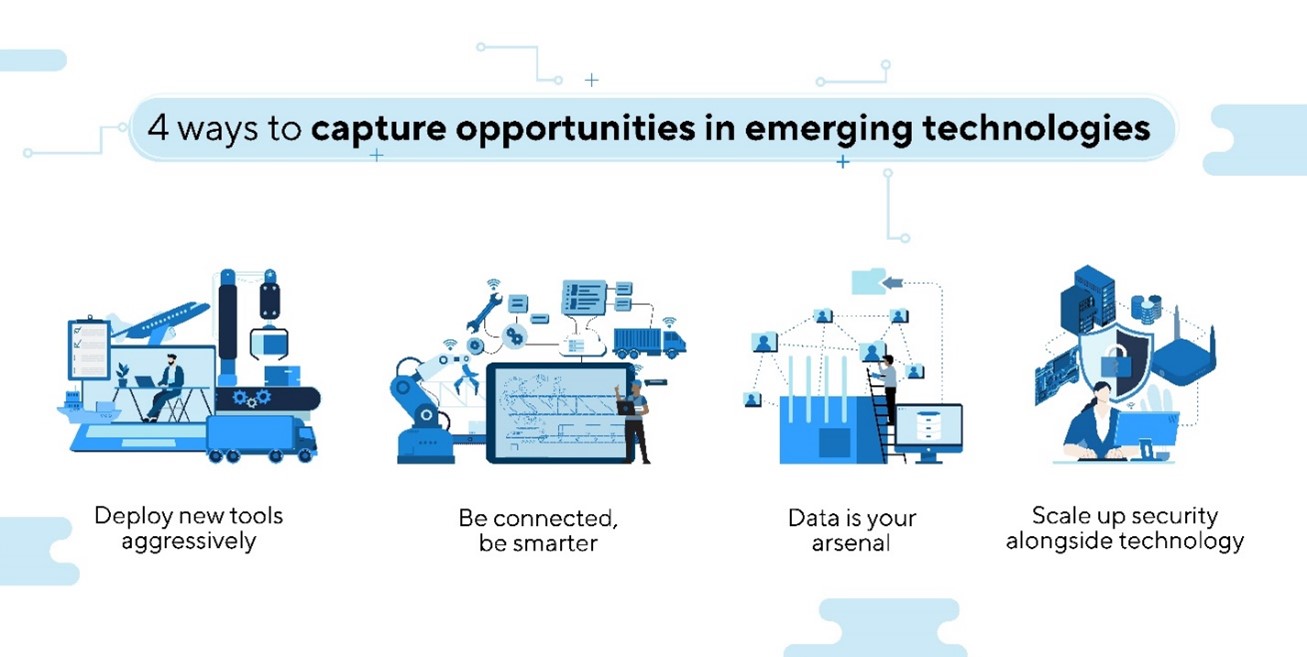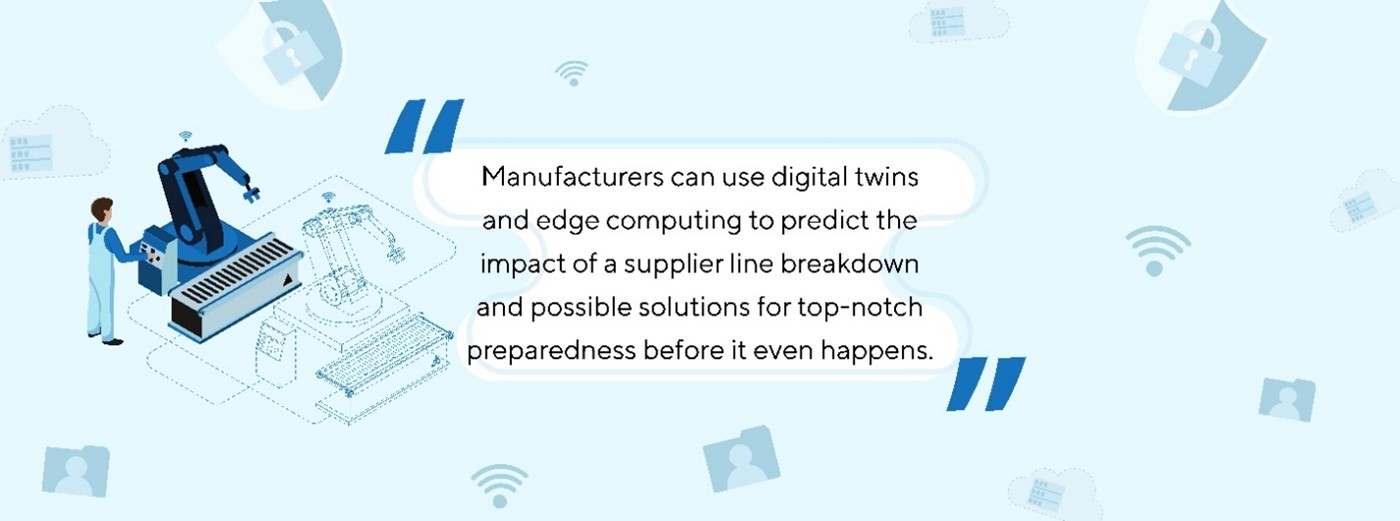Manufacturers: are you at the top? Keep up with emerging tech or get left behind

If you’re a manufacturer, you’ll know how tough it is becoming to keep pace and differentiate yourself, particularly post-COVID disruptions. In a McKinsey survey of over 800 businesses globally, top challenges faced by manufacturers include technology roadblocks and organisational problems — these include inadequate knowledge of digital capabilities or talent to scale digital transformation1.
On the other hand, high-performing manufacturers share commonalities such as their aggressive application of advanced technologies2. These are the manufacturers that stay agile and secure no matter the disruption.
Here’s how you can capture opportunities in emerging technologies to rise to the top as a manufacturer.

Deploy new tools aggressively
In a McKinsey survey, innovators at the fore of their industry say that they use digital tools to enable innovation twice as often as the average company3. Today, staying ahead of the competition means using every tool at your disposal, such as mobile devices, to increase efficiency and optimize your operations.
With mobile devices, manufacturers can track production, monitor inventory, and coordinate shipments. Mobile devices also allow manufacturers to connect with suppliers and customers. The ASUS ExpertBook B6 Flip is the first ASUS mobile workstation that integrates the 12th Gen Intel® HX55 vPro Processors. The 12th Gen HX processor delivers considerable performance improvement over its predecessors in a laptop that we’ve designed to have US military-grade durability and optimal manageability. It features a professional-grade graphics card, the Nvidia RTX A2000, which enables photorealistic rendering when combined with the AI-enhanced neural filter in Adobe Photoshop. This helps engineers create immersive and accurate visualisations so that they can iterate quickly and bring the amazing products they envision to life. The ExpertBook B6 Flip also supports ECC memory and the TCG Opal SSD for top-notch computing power and memory support. Standing at just 2.7 kg and 27.7mm, the ExpertBook B6 Flip meets functionality and form to boost production and reduce equipment time. equipment time.
Those who find deploying new tools optional are those who will find themselves playing catch-up.
Be connected, be smarter
Diving into the lesser-used functions of integrating intelligent edge computing and artificial intelligence of things (AIoT) for smart manufacturing will also set you apart. Why?
Currently, the top applications of AIoT are predictive maintenance and quality inspection4. One of the largest manufacturers of mechanical power presses in Taiwan, Chin Fong Machine, shows just how advantageous AIoT is for inspection. For one, they are saving up to 80% project-development time and improving their competitive advantage by using ASUS IoT AISVision to complete their quality inspections with new speed and precision.
Simultaneously, AIoT can do a lot more from product and supply chain optimisation to even physical threat detection. Imagine this: Manufacturer A connects its forklifts and automated vehicles to a network. Now the vehicles can adapt to live conditions and “communicate” with each other to get the right vehicle to the right tasks at the right time, improving overall efficiency.

Intelligent edge computing can take IoT a step further. Leading manufacturers are developing digital twins for key processes that can model potential issues and responses using edge computing5. This means that Manufacturer A can use its digital twin and edge computing to predict the impact of a supplier line breakdown and chart possible solutions for top-notch preparedness before it even happens. Edge computing and IoT can even be used to tap into past consumption patterns to forecast demand, and suggest improvements to how resources are being allocated for optimal production and profits.
ASUS believes in bringing together edge computing and the co-creation of unique AIoT solutions with customers to help them maximise their investments. Just recently, ASUS IoT partnered with Google to grow Coral, a platform that helps startups and enterprises bring on-device AI application ideas from prototype to production6. These have the potential to improve security, quality, efficiency, overall equipment effectiveness (OEE), and profits for manufacturers.
Data is your arsenal
One question manufacturers often have is, how does one improve price competitiveness, and expand into new customer bases and markets? To that we say, work smart, not hard.
Manufacturers can use data from connecting with customers to create better products and build customer loyalty. A consumer electronic appliance manufacturer, for instance, can tap into the profiles of and choices made by their customers. Do they have more customers seeking appliances for home use or industrial uses? How soon do they replace the appliances they buy? Data can help you make smarter, more relevant products in the future.
Earlier we touched on intelligent edge computing; this can be used to analyse customer data too. Edge computers can process, filter, analyse and act on data received in real-time. ASUS Edge computers are designed and built for 24/7 operation with stability and reliability in mind, reducing the traffic of data while lowering latency and costs of data transmission. The PE400D series, for example, is usually placed in the control center owing to its powerful computing performance and expansion capabilities, such as AI accelerator cards. This means that the edge server can display the OEE of the factory and do some real-time AI analytics on the big data that it collects from all points. And even if your IoT devices run on different operating systems (OS), there are now unified platforms that can integrate those devices and analyse the data collected across all those devices such as the ASUS IoT Cloud Console.
Scale up security alongside technology
Security is a cause for concern as the increase in digital technologies brings a new level of cyber complexity. A survey by Deloitte revealed that few companies have extended their cyber threat detection to their control systems and operational technologies, such as IoT devices7. This suggests their unawareness of new threats that come with IoT and other emerging technologies.
One way to stay ahead of threats is to use devices with robust, built-in endpoint protection. Most ASUS routers and WiFi mesh systems include ASUS AiProtection Pro technology powered by Trend Micro™ along with comprehensive network security solutions. AiProtection Pro provides free enterprise-grade network security with privacy protection and IoT security from a router to every connected device. Unlike normal DNS-based filtering, the always up-to-date cloud database helps to prevent infection even before a user clicks or taps on a link.
Four of ASUS’ WiFi 6 routers and one mesh WiFi system also attained Level 4 of Singapore’s Cybersecurity Labelling Scheme recently — the highest rating available on the world’s leading Cybersecurity Labelling Scheme. These are examples of powerful, reliable devices that have gone through software assessments and structured penetration tests by third-party labs for watertight security.
Easy threat detection is also vital for worry-free operations. This means prioritising thoughtful software solutions. Devices like the ASUS ExpertBook and ExpertCenter allow for centralised IT management which empowers your teams to detect risk in various devices remotely from a single location. The Trusted Platform Module (TPM 2.0) securely stores your keys and digital certificates for ease of use, while data and biological identity security add peace of mind, protecting your critical data and manufacturing processes from the inside out.
Any manufacturer worth their salt will know that staying ahead of the competition fundamentally means constantly striving for improvement, being proactive about adopting new tools, and keeping customers’ needs in view. If done right, leading the pack will come naturally.
Are you a leader or a laggard?

